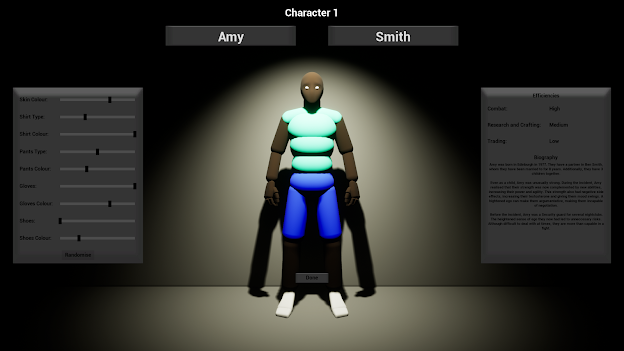Further Research into the Topic
Along side my progress in the practical development of my title and planning for future stages, I have also been taking a look into the Psychological side of my chosen topic. This has given me valuable information about how character attachment can be handled correctly and poorly and by applying them to past instances of the theorys spoken about, I will gain a much better understanding of the ways in which psychology can be applied to my practical work.
Reading the article 'I'm Attached, and I'm a Good Guy/Gal!' (https://www.researchgate.net/publication/221837182_I'm_Attached_and_I'm_a_Good_GuyGal_How_Character_Attachment_Influences_Pro-_and_Anti-Social_Motivations_to_Play_Massively_Multiplayer_Online_Role-Playing_Games) has given me some valuable information about studies done on the impact of a players social interaction type, be that pro or anti-social. These behaviors are linked with a major difference in how players interact with their characters. According to the study, Anti-social gaming motivations are linked with a decreased sense of responsibility for actions and consequences. This suggests that pro-social gamers are more likely to become deeply attached to a character, whether in multiplayer or not, as these characters become an extension of them player themselves. This nourishes the idea that anti-social players are more at risk of disassociating their actions from consequences, perhaps influencing their behavior away from the virtual space.
Indeed, this argument has been used many times against the gaming industry. For example, the game series Grand Theft Auto, although a blockbuster AAA series, regularly receives blacklash from the media and even governments around the world, for its sometimes excessive use of unconventional humour and violence. In an article from the Guardian in 2013 (https://www.theguardian.com/technology/2013/sep/18/grand-theft-auto-5-under-fire-for-graphic-torture-scene), the excessive use of violence in the depiction and satiral use of torture during a particular mission raised questions of the games potential ability to negatively affect those at risk. This would coinside with the theory that those who are anti-social could possibly be at a greater risk of being influenced by games such as Grand Theft Auto. Ironically, Grand Theft Auto has won awards for its character developments and ability to make a player invest in those characters. This would contradict the theory about social behaviour having an impact, as pro social gamers are said to be more likely to become invested in a character. Indeed, many articles have sprung to the defense of the title. One such one (https://www.telegraph.co.uk/science/2017/03/08/violent-video-games-like-grand-theft-auto-do-not-make-players/) states that studies done into the neurological presence of aggression between players and non-players of violent video games were the same. This suggests that the violence shown in these titles has no impact on the effect the game has on them.
These are important facts to consider, seeing as the players interaction to the game becomes paramount when trying to iduce an attachment to occur. How a player involves themselves in the characters story and the factors affecting this are most important for the creation of interesting and relatable characters. Indeed, some games use their mechanics to breed a relationship not brought by a relatable story, but by the players own creation of the character. Multiplayer games such as Destiny and Elder Scrolls online allow you to control every aspect of your character. They are an extension of you before the story begins, as you created them yourself. In a similar fashion, the latest Star Wars game, Jedi Fallen Order, uses story explained powers to create the sense that although you havent created their appearance and personality, they are an extension of you, as you learn the mechanics and powers available to you together in a seemless way. In contrast to this, games such as The Outer Worlds allow you to improve every trait of your character and unlock powerful abilities by spending points you have earned.
In application, I believe I could do well to offer both sides of what social behaviour types would enjoy using. By limiting the choice down to key and strategic bonuses relating to a pre determined path of powers and abilities, I can allow the player to experience the reward of learning these abilities and also have a sense of control over how they are honed and perfected. In a similar vain to Skyrim, my players could learn their new abilities from places around the world and be able to unlock them using power they draw from their enemies. Equally, they could learn powers directly from slain foes, perhaps offering them the opportunity to see them in application and understand their capabilities. This would be the best option, as it would give me the balance I am looking for.
Not only does the article talk about social behavior types, but also gender and its effect on the players interaction with a character. Female gamers are said to be expectant of being pre-allocated nurturing playstyles, such as healers and other noncombatant roles due to the mysogynistic practise of making male characters the fighter. This practise should be one that I avoid, as the option to play in any style should be open to anyone, whether that impacts the characters story or not. A players choice to tackle missions in their own way becomes crucial in the gameplay of a good character. The story may be unchanged, but how the player handles puzzles and combat will allow them the sense of control they need and by allowing them this freedom, they are more likely to have an attachment to their player.


Comments
Post a Comment